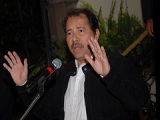Ortega, Nicaragua’s Worst Option
By Samuel Logan for ISN
According to analysts and reporters in Managua, since entering office in early 2007, Ortega has allegedly rigged municipal elections, manipulated the Supreme Court, replaced democratically elected mayors, and is now using questionable political maneuvers to amend the constitution so he may run again for president.
His party could have as many as 52 of the 56 votes - or 60 percent control - necessary to amend the constitution, a four-vote race that began in late August when Nicaragua's National Assembly returned for a four-month working calendar before the end of the year.
Observers expect that Ortega's battle for reelection will be won or lost before early November, and if he wins, it could be the end of what most would consider democracy in the Central American country.
Ortega reentered office in early 2007 amid a controversial election that catalyzed a political rift that has continued to grow between the FSLN and the opposition. Since then, concerns over Ortega's backroom dealings have led to the cancellation of some $190 million in development and budgetary aid over the past two years, according to a external page20 August reportcall_made from the Christian Science Monitor. US Senator John Kerry has condemned Ortega's "manipulation" of Nicaragua's judicial system. It "reeks of authoritarianism," he was quoted as saying.
In August, Nicaraguan Supreme Court justices selected seven Sandinista judges to replace boycotting opposition justices to reach a quorum, allowing the court to go back to work after an eight-month standoff. Not surprisingly, Ortega's opposition in the Liberal Constitutionalist Party (PLC) external pagedeclared the movecall_made "unconstitutional and illegal," raising real concern that the Sandinistas, in their bid to take over the National Assembly, have seized control of Nicaragua's judicial system.
The PLC, which exercises considerable control in the National Assembly, cannot bring together disparate opposition minority parties into a solid voting block. Meanwhile, the Sandinistas have quietly collected as many as 52 votes through coercion and pressure upon smaller parties, though their absolute control in the assembly only reaches as many as 43 seats, leaving them 13 votes short of a majority.
At the core of the opposition's voting conundrum is Ortega's January 2010 decree that extended the term of 22 Sandinista legislators, who still remain at their posts. The opposition's stand against this decree prevented the National Assembly from meeting until last week. The opposition's first order of business will likely focus on the highly controversial presidential decree, but it remains unclear if they will be able to remove the Sandinista legislators before the end of their secession.
Now, as Nicaragua nears the moment that the National Assembly meets to vote on the constitution, observers consider that if allowed to run again for president, Ortega would likely win. Voter abstention could seal his victory, where over 50 percent of Nicaraguan voters would stay at home, not happy with any of the candidates. Sandinista supporters - a tight and disciplined, albeit small voting block - would provide 100 percent support for Ortega, bringing him back into office with a minority mandate.
Some argue that Ortega has constructed a external pagecult of personalitycall_made, while bringing his country closer to Venezuela, Russia and Iran. Allegations of high-level collusion with drug trafficking remain inconclusive but not surprising. If Ortega manages to remain in office for a second term, Nicaraguans would surely suffer.
From the outside, regionally organized criminal groups would take advantage of lax government controls to increase drug transits through Nicaragua, pushing up crime and drug addiction rates, while a shadowy internal threat, "external pageComandante Jahobcall_made," could gather the political fuel and human capital required to spark another Nicaraguan insurgency against the Sandinistas - this time not funded by the US but spurred on by Ortega's own mismanagement of his government and its constituents.

